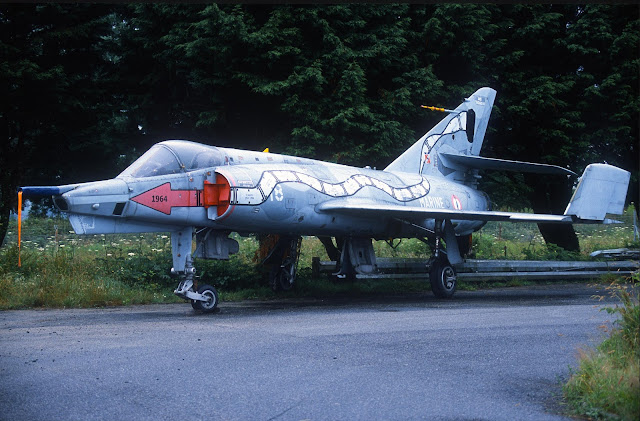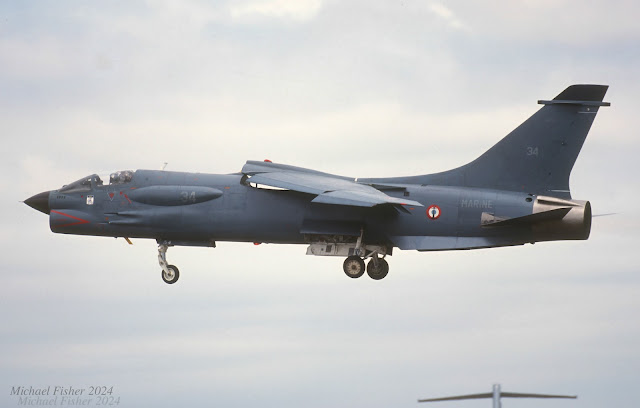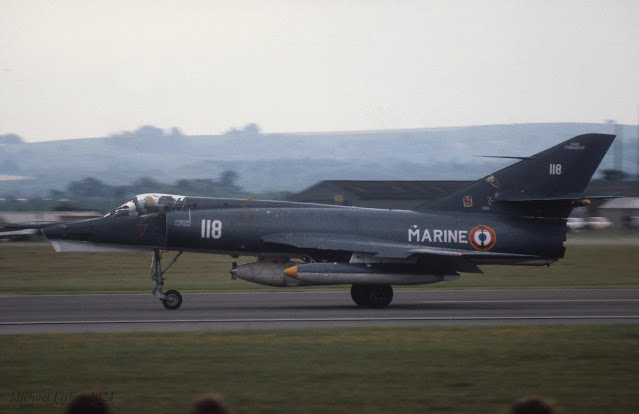, which I was visiting back in June 2003.
The rain was endless, and the mist made the weather seem tropical. Passing through the aircraft maintenance hangers at the rear of the ramp, I emerged onto a road that I have named the
Avenue d'Crusader, perhaps the Avenue of Death. Here, you could find the last of these
Iconic Vought F-8P fighter jets, formerly F-8E and the remains of another famed jet, the
Dassault Étendard IV and IVPM, all belonging to the
French Aéronautique Navale. They had seen combat on ships and land worldwide, but their days were numbered; their fate was sealed, and a lucky few would be stored or preserved at various French air bases.
As you entered the fictitious Avenue d'Crusader, the jets were parked to the right and left, sadly, all looking neglected.
The Vought F.8 Crusader was chosen over the
Phantom II for a defensive role on the new
Foch and
Clémenceau aircraft carriers. With the Phantom too large for these ships, a test evaluation flight was conducted in March 1962. It was performed on the
Clémenceau using two F-8s from
VF-32 based on the
U.S.S. Saratoga. Following the test's success, an order was placed for 46 all-weather interceptor aircraft, comprising 6 two-seater and the rest single-seater aircraft. It later transpired that the order changed to single-seaters only.
On July 6, 1965, a Crusader made its first airborne refuelling from an
Étendard 1VP. They formed
Carrier Air Wing 2, with 12F and 14F officially coming into service on March 1, 1966. Both squadrons moved from their home base at
Lann-Bihoué to
N.A.S. Landivisiau. 
In September 1984, the F-8 Crusaders embarked on the Foch for the first Olifant IV mission in Lebanon. In September 1983, just a year after the first Olifant mission, they returned for Olifant XVII. Then, in January 1984, they participated in Olifant XX, which took place entirely in Lebanon. By October of 1984, 12. F was embarked on the Clémenceau, heading to Libya and Operation Mirmillion.
By 1993, trouble had arisen in the former Yugoslavia, and both the Foch and Clémenceau deployed to the Adriatic Sea for the Balbuzard missions. The missions ceased in June 1999 with the conclusion of Operation Allied Force over Kosovo.
They began their update program in 1993, but their fate was set: They would all be withdrawn from service by the end of December 1999.

In October 1999, three aircraft, Numbers 11, 34, and above 39, participated in their last exercise. They operated from the Foch during exercise PEAN 99 alongside Sea Harriers and AV-8s.
After 140,000 flight hours, 25,000 catapults, and landings, the last F-8s or what was left, retired to the
Avenue d'Crusader at
N.A.S. Landivisiau in
Brittany.
The
Étendard IV was designed after the
Korean War, and only the French Aéronautique Navale was interested in procuring the aircraft.
On May 21 1958, the first of five pre-serial aircraft took to the skies. It quickly became a fine, high-performance assault fighter aircraft with a secondary role as an interceptor and in aerial combat. With its proven performance and external payload capability. The
French Aéronautique Navale ordered 90 jets from
Dassault. The order was placed for 69 Étendard IV M and 21 Étendard IV P (photo-reconnaissance models fitted with five cameras in their sleek nose cones). They, too, were to be deployed on the new Clémenceau class carriers and the Foch. The first production aircraft flew on July 16, 1961, at
Mérignac, near Bordeaux.
The Étendard IV was Dassault's first naval project, and what an achievement it was. It served in many campaigns, including most of the ones mentioned for the F.8s. During my visit, the only airframes left were the Étendards IVPMs. These have a long and complete record.
118 Étendard IVPM.
Painted in unique markings to mark the July 2000 deactivation of
Flotilla 16. F at Landivisiau.
115 Étendard IVPM 16.F FN.
As I mentioned, they were involved in numerous combat situations. For aircraft 115, April 15, 1994, was a bad day as it was hit by an
S.A.M. missile while on a photo run over
Gorazde during a
Balbazard mission over
Bosnia. Riddled with shrapnel holes and no elevators, the 16. The commanding officer and pilot returned the damaged aircraft to the Clémenceau carrier with the help of his wingman flying alongside.
By June 27 2000, Étendard 115 was back flying from the
Foch on its last cruise in the Adriatic Sea on photo reconnaissance missions. They participated in fifty-eight missions during the previous cruise across Kosovo, and when this aircraft made its last launch from the Foch on July 27, it had witnessed
16. F stand-down at Landivisiau airbase in Brittany. Its mark of 18 films was still evident in 2003.
107 Étendard IVPM 16.F FN.
Clearly evident is the side-photography capability of these aircraft.
107 Étendard IVPM 16.F FN.
It carries 21 mission marks from 16 Flotillas' final cruise on the Foch.
109 Étendard IVPM 16.F FN.
Carries 19 mission marks.

153 and 163 Étendards IVPM 16.F FN.
153 Étendard close-up of its markings.
101 Étendard and, sadly, the most neglected withdrawn-from-use airframe present in 2003.
Here are some of the above aircraft's better moments.
39 F-8P Crusader 12.F FN (
Aéronautique Navale).
34 F-8P Crusader 12F.F.N.
Following very fast behind 39 above.
The Vietnam War Museum has registered it as
N3512Z on the US register and hopes to raise the funds needed to ship it to the USA and perform the initial restoration.
What a sight it would make to see it back in the air!
Watch this space.
7 F-8P Crusader 12F F.N.
Seen preparing to depart I.A.T. on departure day, July 27 1999.
39 F-8P Crusader 12F F.N.
39 F-8P, having had technical problems during the Sunday Tattoo, was left stranded near the threshold to runway 09. Monday morning saw the arrival of 80/A.W., a
Nord 262 from
ETE00.041 based at
Villacoublay. It had picked up a ground crew from N.A.S. Landivisiau to necessitate the repairs on the stranded Crusader.
40 Vought F-8E Crusader F.12 FN.
It participated in the flying display at R.A.F. Greenham Common along with F-8E 32 during the 1981 I.A.T. This was the original colour applied to the French Aéronautique Navale F-8E Crusaders, which is, in fact, very similar to the US Navy F-8 colour scheme. They later transitioned to a dark grey, followed by the last and final blue-grey, as seen above.
What a superb-looking jet they were.
Seen arriving at R.A.F. Greenham Common for the 1981 I.A.T. (International Air Tattoo).
Seen arriving at R.A.F. Greenham Common for the 1983 I.A.T. (International Air Tattoo).
Departs on runway 06 from R.A.F. Fairford on departures on Monday at 1989 I.A.T.
Thanks for taking the time to look. Comments and updates are always welcome.
Happy Days.























If I recall correctly, F-8 Crusader 39 suffered a tyre burst on landing following a PIO at RIAT 99 hence the requirement for repairs.
ReplyDeleteHi Tim, Your memory serves you well. Thanks for your comment. Mike.
ReplyDelete